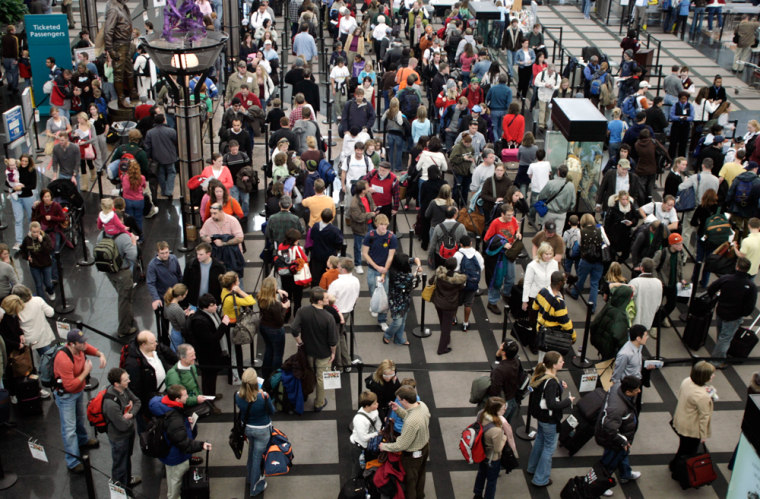For many travelers, 2006 couldn't end fast enough. For some it was the eye-popping price at the pump; for others, the groan-inducing breakdowns at baggage claim. Either way, it was clearly a year of long lines and short tempers.
So, what does 2007 hold in store? Good question, and while I wouldn’t be so presumptuous as to propose an all-encompassing, one-size-fits-all answer, I think recent events offer some interesting hints about travel in the coming months. If nothing else, they’re worth considering before you book your next flight, rent another car or reserve a hotel room.
In the air
Think 2006 was a bumpy year for the airline business? Get ready for some more turbulence. Will US Airways be successful in its takeover bid for Delta? After US Air boosted its offering price, it's anybody's guess. Will other mergers be proposed and ultimately put together? They have and they will. And will the end result be greater efficiency, better service and lower fares? I wouldn’t count on it.
After five years of staggering losses, the U.S. airline industry has slashed fleets, jobs, services and anything else it could get its hands on to combat overcapacity, unsustainable pricing and sky-high fuel costs. And with little else to cut, mergers and buyouts probably start looking pretty attractive, especially since the industry is actually flirting with the prospect of profitability.
But I just don’t see them passing any savings on to the rest of us. Sure, in some cases, discount airlines may expand into new markets, putting a ceiling on potential fare increases. In others, more direct flights and increasingly efficient aircraft will counter tangled route maps and rising fuel costs. And yet, spot bargains aside, I just can’t see those factors outweighing the one-two punch of strong demand and fewer seats.
Or, to put it more bluntly, planes will continue to fly full and fares will go up in 2007. The American Express Global Business Travel Forecast pegs the increase in domestic economy-class fares at 3-6 percent for next year.
Most of us, though, will fly anyway, even if it means paying for pillows and cattle-car seating. We may get lucky – say, when a discount airline opens a new route and sparks a short-term fare war – but, for the most part, we’ll pony up for the full-fare ticket. If that’s the case, it’s not too early to start planning that spring fling or summer vacation right now.
On the ground
Get ready to pay more when you book a hotel room or rent a car, too. According to the American Express forecast, rates for mid-range hotels in the U.S. will likely rise 3-6 percent in 2007, with upper-range hotels bumping their rates 4-8 percent. They also predict that rental-car rates will increase 4-6 percent.
The rental-car industry, for example, depends on the rental companies’ high-volume, low-margin fleet programs with Detroit’s Big Three automakers. But with Motown cutting production to counter its own financial woes, guess which programs are the first to feel the pinch? Take those cars out of the mix and rental-car companies can either cut their own fleets or pay more for higher-class cars. Either way, rental rates go up.
Then there’s the sticker shock from all those added fees and taxes. According to a just-released study from Travelocity, such fees – you know, where visitors foot the bill for local improvements – increased at the nation’s major airports from 25.8 percent in March 2005 to 28.04 percent in December 2006. Though the fees are often lower at neighborhood locations, I’m guessing most of us will just suck it up at the terminal counter.
We may be doing the same at the front desk, too. The U.S. hotel industry currently sells something like 1 billion room-nights per year, a measurement that roughly translates into a whole lot of people wanting the same room you do. Combine strong demand with a constricted supply, and it’s not surprising that industry analysts Smith Travel Research expect the average hotel rate in the U.S. to break $100 a night (up from $96) for the first time in 2007.
Not all bad news
That’s a hunk of change, especially when you combine it with the likely increases in airfares or car rental fees. And yet, despite all that, I think there is cause for optimism. If nothing else, strong demand and tight supply provide fertile ground for growth and a powerful incentive for innovation.
Take the hotel business. Currently in the midst of a demand-driven building boom, it’s also undergoing a major upgrade with every new property offering more and better amenities. Or consider rental cars, where more and more models are coming with sunroofs and decent stereos. And who knows, maybe the airlines will begin selling tickets that reflect what we get for our money, rather than just the price we pay.
So, yeah, I expect to pay more for travel in 2007, but I also expect to get more, and barring major catastrophes (oil issues, terror threats, etc.) I think it’s a reasonable request. If we, as travelers, can’t dictate prices, we can at least demand value for our travel dollars. Those companies that provide it will do well, setting the pace for 2008.
Rob Lovitt is a frequent contributor to MSNBC.com. If you have feedback for Rob, .
